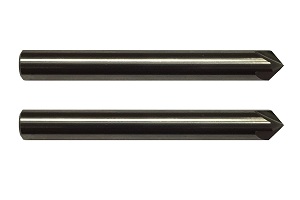Spot Drills to Chamfer Mills: A Look At Common Milling Tools
Milling machines have helped to revolutionize the process of producing custom components. Thanks to computer numerical control, these tools can produce incredibly accurate components from materials like steel and aluminum in a fraction of the time it would take using other production methods. Different types of cuts and operations require different end mills and drill bits. Today we will be taking a look at a wide range of tools including various drill bits, end mills, chamfer mills, and other milling cutters.

End Mills
The most common type of milling cutter is an end mill. There are a few different types of end mills for performing different cuts.
● Standard End Mills – The most common types of cutting tools are your standard square and ball ended milling cutters. They are designed to cut sideways and remove material using their sharpened flutes.
● Variable End Mills – Variable end mills are typically square ended milling cutters that have extremely subtle asymmetrical designs. This helps to limit internal vibrations and allow for high speed milling operations.
● Six Flute End Mills – Tools with higher flute counts are designed to cut into harder materials like steel. They cut smaller chips, which makes them ideal for working with materials that might fatigue other tools.
Drill Bits
While end mills are great for side milling operations, they are a poor option for adding holes to a workpiece.
● Stub Drills – The shortest twisted drill bits, stub drills are designed to be extremely rigid and produce accurate holes.
● Jobber Drills – This is the standard drill bit length, which is used to drill deep holes. The length of these drill bits can hamper their accuracy.
● Spot Drills – In order to drill accurate holes in a workpiece, spot drills are used to create small dimples that mark the location of holes. Their cutting surface is limited to a point, so they are short and accurate.
Specialized Tools
In addition to the tools listed above, there a
● Chamfer Mills – Chamfer tools are a common finishing tool that has an angled cutting point. This point adds an intermediate plane between two faces where they meet, which can help soften sharp edges.
● Full Form Thread Mills – These tools are designed to cut an entire threaded surface in one 360 degree pass. They can be used to cut both internal and external threads, but are limited to only being able to cut one thread pitch per tool.
● Single Pitch Thread Mills – Like full form tools, these specialized cutters are used to cut threads. Single pitch cutters are designed to cut along the entire length of the threads. This is more time consuming, but also far more versatile as one tool can cut different thread pitches.
● End Mills for Aluminum – Aluminum is an extremely soft metal that creates its own challenge during high speed machining. Tools for cutting aluminum have low flute counts and high helix angles, which helps to break and evacuate the long and stringy chips produced when machining aluminum.
● Drill Mills – These tools combine the side cutting flutes of end mills with the sharp point of a drill bit. They can perform a wide variety of drilling and milling operations.
If you need some high performance tools for your shop, you can find a huge selection of solid carbide milling tools at Online Carbide. As an American manufacturer of quality tools, their team is dedicated to offering tools that are designed to hold their edges and last longer than options manufactured from steel. To see their selection, which includes everything from chamfer mills to drill bits, visit www.onlinecarbide.com.
For more information about Buy Carbide Drills and Drill Mills Please visit : Online Carbide.
